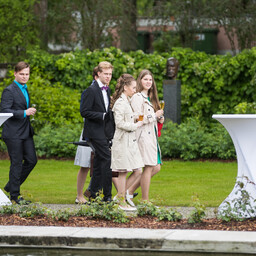Vene noored Eestis tahavad rohkem tunnustust
ja
soovivad edukat karjääri
. Nad rõhutavad oma saavutusi ja tahavad, et neid tunnustataks.
Eriti Ida-Virumaal soovivad nad paremat elu
. Tartu Ülikooli uuring näitab, et
vene noored on rohkem kollektivistlikud
. Nad
tahavad teiste arvamust ja kontrolli oma ümbruse üle
.
Vene noored Eestis tahavad rohkem tunnustust
Tõlge fraasile: Vene noored Eestis tahavad rohkem tunnustust
EN
Russian youth in Estonia want more recognition
soovivad edukat karjääri
Tõlge fraasile: soovivad edukat karjääri
EN
want a successful career
Eriti Ida-Virumaal soovivad nad paremat elu
Tõlge fraasile: Eriti Ida-Virumaal soovivad nad paremat elu
EN
Especially in Ida-Viru County, they want a better life
vene noored on rohkem kollektivistlikud
Tõlge fraasile: vene noored on rohkem kollektivistlikud
EN
Russian youth are more collectivistic
tahavad teiste arvamust ja kontrolli oma ümbruse üle
Tõlge fraasile: tahavad teiste arvamust ja kontrolli oma ümbruse üle
EN
want the opinions and control of others over their environment
Vene noored peavad tähtsaks edukat karjääri. See annab neile enesekindlust ja võimaluse silma paista. Eesti noored väärtustavad rohkem iseseisvumist. Vene noorte jaoks on oluline ka materiaalne heaolu ja turvatunne. Nad kardavad töötuks jäämist.
Eesti keele oskus on oluline
.
Noored, kes räägivad eesti keelt hästi, on rohkem Eesti ühiskonnas
. Neil on rohkem eestlasi sõprade seas. Kehvema eesti keele oskusega noored suhtlevad enamjaolt vene keeles.
Nad tahavad Narvast lahkuda, et saada paremaid võimalusi
.
Eesti keele oskus on oluline
Tõlge fraasile: Eesti keele oskus on oluline
EN
Knowledge of the Estonian language is important
Noored, kes räägivad eesti keelt hästi, on rohkem Eesti ühiskonnas
Tõlge fraasile: Noored, kes räägivad eesti keelt hästi, on rohkem Eesti ühiskonnas
EN
Youth who speak Estonian well are more integrated into Estonian society
Nad tahavad Narvast lahkuda, et saada paremaid võimalusi
Tõlge fraasile: Nad tahavad Narvast lahkuda, et saada paremaid võimalusi
EN
They want to leave Narva to get better opportunities
Vene noored saavad infot peamiselt sotsiaalmeediast
ja vene keelsetest uudistest. Nad eelistavad venekeelseid allikaid mugavuse tõttu.
Parem eesti keele oskus aitaks neil paremini integreeruda
Eesti ühiskonda.
Vene noored saavad infot peamiselt sotsiaalmeediast
Tõlge fraasile: Vene noored saavad infot peamiselt sotsiaalmeediast
EN
Russian youth mainly get information from social media
Parem eesti keele oskus aitaks neil paremini integreeruda
Tõlge fraasile: Parem eesti keele oskus aitaks neil paremini integreeruda
EN
Better knowledge of Estonian would help them integrate better
Vene noorte identiteet on segamine
.
Nad ei tunne end täielikult venelastena ega eestlastena
.
Paljud nimetavad end eestivenelasteks
.
Nad armastavad Eestit, kuid tunnevad end ebakindlalt
.
Nende vanemad ja vanavanemad tulid Eestisse Nõukogude ajal
. Nooremad põlvkonnad räägivad eesti keelt paremini.
Vene noorte identiteet on segamine
Tõlge fraasile: Vene noorte identiteet on segamine
EN
The identity of Russian youth is mixed
Nad ei tunne end täielikult venelastena ega eestlastena
Tõlge fraasile: Nad ei tunne end täielikult venelastena ega eestlastena
EN
They do not fully feel like Russians or Estonians
Paljud nimetavad end eestivenelasteks
Tõlge fraasile: Paljud nimetavad end eestivenelasteks
EN
Many call themselves Estonian Russians
Nad armastavad Eestit, kuid tunnevad end ebakindlalt
Tõlge fraasile: Nad armastavad Eestit, kuid tunnevad end ebakindlalt
EN
They love Estonia but feel uncertain
Nende vanemad ja vanavanemad tulid Eestisse Nõukogude ajal
Tõlge fraasile: Nende vanemad ja vanavanemad tulid Eestisse Nõukogude ajal
EN
Their parents and grandparents came to Estonia during the Soviet era
Russian youth in Estonia want more recognition and desire a successful career. They emphasize their achievements and want to be acknowledged. Especially in Ida-Virumaa, they want a better life. A study by the University of Tartu shows that Russian youth are more collectivist. They seek the opinions of others and control over their surroundings.
Russian youth consider a successful career important. It gives them self-confidence and the opportunity to stand out. Estonian youth value independence more. For Russian youth, material well-being and a sense of security are also important. They fear unemployment.
Estonian language skills are important. Young people who speak Estonian well are more integrated into Estonian society. They have more Estonians among their friends. Young people with poorer Estonian language skills mostly communicate in Russian. They want to leave Narva to get better opportunities.
Russian youth get information mainly from social media and Russian-language news. They prefer Russian-language sources for convenience. Better Estonian language skills would help them integrate better into Estonian society.
The identity of Russian youth is mixed. They do not feel fully Russian or Estonian. Many call themselves Estonian Russians. They love Estonia but feel insecure. Their parents and grandparents came to Estonia during the Soviet era. Younger generations speak Estonian better.

